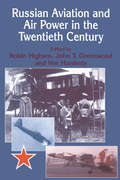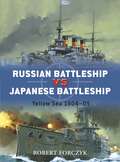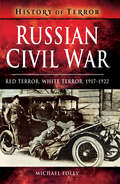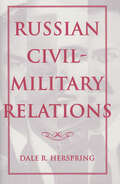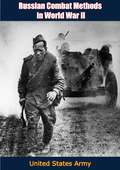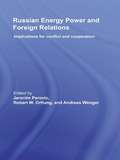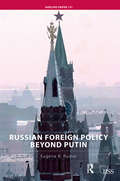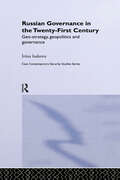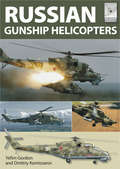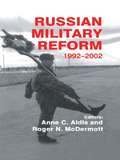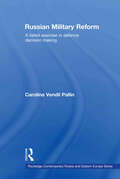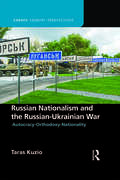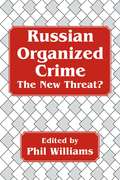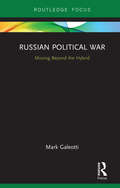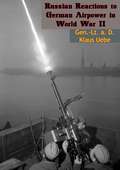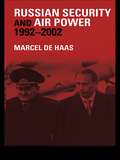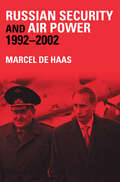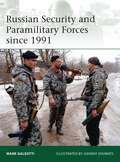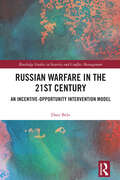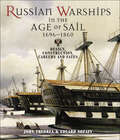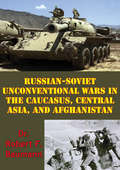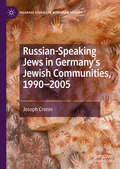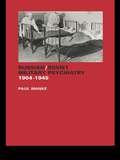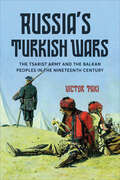- Table View
- List View
Russian Aviation and Air Power in the Twentieth Century (Studies in Air Power #Vol. 7)
by Von Hardesty Robin Higham John T. GreenwoodIn the light of new archival material the editors take a fresh look at Russian aviation in the twentieth century. Presenting a comprehensive view of Russian aviation, from its genesis in the late czarist period to the present era, the approach is essentially chronological with a major emphasis on the evolution of military aviation. The contributions are diverse, with appropriate attention to civilian and institutional themes.
Russian Battleship vs Japanese Battleship
by Howard Gerrard Robert Forczyk Ian PalmerThe first major clash between a European and Asian state in the modern era signalled the beginning of Japan's rise as a major power on the world stage. What began as differing expansionist interests in Manchuria and Korea developed into a full-blown war in 1904, with an unexpected outcome. Watched by the rest of the world's superpowers, this incredibly violent war was disastrous for the Russians who, despite their superior numbers, were defeated by the Japanese underdogs in a spectacular fashion. Japan won major victories against the Russians including the critical naval battle of Tsushima in May 1905 which saw almost the entire Russian fleet sunk, captured or interned. This was the first and last encounter of pre-dreadnought battleships and it was a huge success for Japanese tactics, skill and planning. This book discusses the design and development of the pre-dreadnoughts that would ultimately lead to a new wave of battleships. The key technical elements of firepower, protection, maneuverability and communications for each side are covered in detail and accompanied by first-hand accounts and specially commissioned artwork to explain and illustrate this historically significant duel.
Russian Civil War: Red Terror, White Terror, 1917–1922 (History of Terror)
by Michael FoleyThis historical study examines how the Bolshevik Revolution and Russian Civil War influenced events on the world stage in the Great War and beyond.The Russian Revolution of 1917 is remembered as the catalyst for a bloody conflict between the Communist Red Army and the anti-Communist White Army. But in reality, the conflict was far more complex and multifaceted, involving forces from outside Russia. In this probing history, Michael Foley examines the Russian Civil War in terms of its relationship to the larger conflict raging across Europe. It is an epic tale of brutal violence and political upheaval featuring a colorful cast of characters—including Tsar Nicholas II, Vladimir Lenin, Leon Trotsky, Joseph Stalin and Winston Churchill.
Russian Civil-Military Relations
by Dale R. HerspringFrom the author of Rumsfeld’s Wars, “an important addition to the bookshelf of any analyst of post-Soviet security affairs” (Slavic Review).Dale Herspring analyzes three key periods of change in civil-military relations in the Soviet Union and postcommunist Russia: the Bolshevik construction of the communist Red Army in the 1920s; the era of perestroika, when Mikhail Gorbachev attempted to implement a more benign military doctrine and force posture; and the Yeltsin era, when a new civilian and military leadership set out to restructure civil-military relations. The book concludes with a timely discussion of the relationship of the military to the current political struggle in Russia.“The history is both fascinating and timely.” —European Security“When military reform returns to its deservedly prominent place in the Russian political agenda, Herspring’s book will offer invaluable guidance.” —Mark von Hagen, American military historian
Russian Combat Methods in World War II
by United States Army“This publication was prepared by a number of German officers after the end of World War II. There were a number of these publications, and…they are all of significant importance in understanding the way in which the war was fought, particularly on the eastern front. This publication looks at the Russian method of waging war, which was not always to use the unsubtle steamroller attack. The pamphlet shows how the Russian was different in outlook to the German soldier, and the role of the Commissar. Each arm is examined in some detail, before the discussion turns to the peculiarities of Russian tactics. Winter warfare was the preferred season for war for the Russians, and the mass attacks of 1941 eventually gave way to much more scientific tank/infantry/air/artillery combined attacks, using the weight of manpower to flatten German defenders where they stood. There is also discussion of the importance of the Red Air Force in the war, and of the partisan movement, which was always a thorn in the German’s side. This publication should be read in conjunction with the Soviet Partisan Movement and Small Unit Actions (both in the German Report Series)”-Print ed.
Russian Energy Power and Foreign Relations: Implications for Conflict and Cooperation (CSS Studies in Security and International Relations)
by Andreas Wenger Robert W. Orttung Jeronim PerovicThis book examines Russia's new assertiveness and the role of energy as a key factor in shaping the country's behavior in international relations, and in building political and economic power domestically, since the 1990s. Energy transformed Russia's fortunes after its decline during the 1990s. The wealth generated from energy exports sparked economic recovery and political stabilization, and has significantly contributed to Russia's assertiveness as a great power. Energy has been a key factor in shaping Russia's foreign relations in both the Eurasian and global context. This development raises a host of questions for both Russia and the West about the stability of the Russian economy, how Russia will use the power it gains from its energy wealth, and how the West should react to Russia's new-found political weight. Given that energy is likely to remain at the top of the global political agenda for some time to come, and Russia's role as a key energy supplier to Europe is unlikely to diminish soon, this book sheds light on one of the key security concerns of the 21st century: where is Russia headed and how does energy affect the changing dynamics of Russia's relations with Europe, the US and the Asia-Pacific region. This book will be of interest to students of Russian politics, energy security, international relations and foreign policy in general. Jeronim Perovic is a senior researcher at the Center for Security Studies at ETH Zurich. Robert Orttung is a visiting scholar at the Center for Security Studies at the Swiss Federal Institute of Technology (ETH) in Zurich and a senior fellow at the Jefferson Institute. Andreas Wenger is professor of international security policy and director of the Center for Security Studies at ETH Zurich.
Russian Foreign Policy Beyond Putin (Adelphi Ser.)
by Eugene B. RumerRussia‘s resurgence as an assertive actor in the global diplomatic arena after a long period of introspection and preoccupation with domestic troubles, and the economic revival that underpins it, are among the most striking developments in international relations of recent years. But what drives Russian foreign policy at the end of the Putin era? To what extent is it shaped by Russia‘s role as a major energy supplier, and how long can the country remain anenergy superpower if indeed it is one? How might Russian foreign policy change in the years ahead? Which way will Russia, faced with the might of growing powers around it, and struggling with the fragility of its economic success and stability at home, choose to face in international relations? This Adelphi Paper examines the domestic context of contemporary Russian foreign policy and its key political, economic, military and security drivers, as well as looking at the contrasting outlook that preceded it, and at how Russia‘s international posture may adjust again in the coming years. It concludes with recommendations for Western policy makers on how to respond to Russia‘s return.
Russian Governance in the 21st Century: Geo-Strategy, Geopolitics and New Governance (Contemporary Security Studies)
by Irina IsakovaA stimulating new analysis of the dramatic systemic changes of the Russian state, principles of the governance and its foreign policy orientation. It reviews the extent of changes in Russian approaches to geopolitics and the most appropriate geopolitical development patterns that influenced the transformation of Russian foreign policies and military strategic thinking on the eve of the 21st century.
Russian Grand Strategy: Rhetoric and Reality
by Lynn E. Davis Miranda Priebe Alyssa Demus Samuel Charap Dara Massicot Clint Reach Mark Stalczynski Eugeniu HanUnderstanding Russia’s grand strategy can help U.S. decisionmakers assess the depth and nature of potential conflicts between Russia and the United States and avoid strategic surprise by better-anticipating Moscow’s actions and reactions. The authors of this report review Russia’s declared grand strategy, evaluate the extent to which Russian behavior is consistent with stated strategy, and outline implications for the United States.
Russian Gunship Helicopters
by Yefim Gordon Dmitriy KomissarovFeatures;* Profiles of iconic types such as the Mil MI-24 'Hind', the Mil-28 and the Kamov Ka-52 'Alligator'.* Summary of design histories and careers* Colour reference for paint schemes * Critical review of available kits* Over 180 colour and black and white illustrations, including 20 full colour side-views and a range of various 3-view line-drawings. With profiles of a host of exciting designs, accompanied by a descriptive narrative history of the various types, this volume combines practical information with reflective historical analysis, making for a visually rich volume providing modellers with all they need to know about the most exciting Russian Gunship helicopter designs and associated model kits.This edition deals primarily with the three principal attack helicopter types of the present-day Russian Army;The Mil MI-24 'Hind' otherwise known as 'the Flying Crocodile' has been produced in large numbers with many versions and variants produced. It has been supplied to a host of countries and seen considerable combat action in conflicts both in the Soviet Union and abroad. It still forms the backbone of army aviation in Russia and remains at the forefront of national exposure.The Mil-28 is a more contemporary type and is broadly the equivalent of the McDonnell Douglas AH-64 Apache. The Kamov Ka-52 'Alligator' NATO name 'Hokum-B' also features. This helicopter is in service with the Army and is entering service also with the Russian Navy. Well-illustrated histories and structural analyses are supplemented with detailed descriptions of the various plastic scale model kits which have been released, along with commentary concerning their accuracy and available modifications and decals. This level of detail and insight is sure to prove invaluable to a wide community of model-makers, both at home and overseas.
Russian Military Reform, 1992-2002
by Roger N. McDermott Anne C. AldisMilitary reform has featured prominently on the agenda of many countries since the end of the Cold War necessitated a re-evaluation of the strategic role of the armed forces, and nowhere more publicly than in Russia. Not since the 1920s have the Russian Armed Forces undergone such fundamental change. President Boris Yeltsin and his successor Vladimir Putin have both grappled with the issue, with varying degrees of success. An international team of experts here consider the essential features of Russian military reform in the decade since the disintegration of the USSR. Fluctuations in the purpose and priorities of the reform process are traced, as well as the many factors influencing change. Chapters analyse the development of Russia's security policy, structural reform of the services, the social impact of military service and experience of military conflict in Chechnya. Critical evaluations of the impact of social change on the Russian Armed Forces' capabilities and expectations complement the analysis of the on-going debate. Russian Military Reform, 1992-2002 will prove invaluable to all those interested in civil-military relationships and international security as well as to students of military theory and practice.
Russian Military Reform: A Failed Exercise in Defence Decision Making (Routledge Contemporary Russia and Eastern Europe Series)
by Carolina Vendil PallinThis book examines reform of the Russian military since the end of the Cold War. It explores the legacy of the Soviet era, explaining why - at the time of the fall of the Soviet Union - radical reform was long overdue in the wake of changing military technology, new economic and political realities, and the emergence of new threats and challenges. It discusses the problems encountered by Gorbachev in his attempts to promote military reform in the late 1980s, and goes on to analyse in detail the mixed fortunes of the policies of his successors, Yeltsin and Putin. It describes how the onset of war in Chechnya in 1994 provided clear evidence of the weaknesses of the Russian military in modern conflicts, and shows that although the Chechnya debacle did provide some impetus for reforms in the armed forces in 1997-98, the momentum was not continued under the Putin government. It argues that Putin’s policies of bolstering central control over all aspects of decision making has left untouched many key problems facing the Russian military, including infighting between different force structures, lack of transparency and independent scrutiny over defence spending, and absence of consensus on the main threats to Russia and optimum force posture. Moreover, it argues that in his attempts to concentrate all means of control to a corrupt and inefficient Kremlin bureaucracy, Putin has deprived himself of all alternative channels of independent scrutiny, control and oversight, thus exacerbating the problems that continue to plague the Russian military.
Russian Nationalism and the Russian-Ukrainian War (Europa Country Perspectives)
by Taras KuzioThis book is the first to provide an in-depth understanding of the 2014 crisis, Russia’s annexation of Crimea and Europe’s de facto war between Russia and Ukraine. The book provides a historical and contemporary understanding behind President Vladimir Putin Russia’s obsession with Ukraine and why Western opprobrium and sanctions have not deterred Russian military aggression. The volume provides a wealth of detail about the inability of Russia, from the time of the Tsarist Empire, throughout the era of the Union of Soviet Socialist Republics (USSR), and since the dissolution of the latter in 1991, to accept Ukraine as an independent country and Ukrainians as a people distinct and separate from Russians. The book highlights the sources of this lack of acceptance in aspects of Russian national identity. In the Soviet period, Russians principally identified themselves not with the Russian Soviet Federative Republic, but rather with the USSR as a whole. Attempts in the 1990s to forge a post-imperial Russian civic identity grounded in the newly independent Russian Federation were unpopular, and notions of a far larger Russian ‘imagined community’ came to the fore. A post-Soviet integration of Tsarist Russian great power nationalism and White Russian émigré chauvinism had already transformed and hardened Russian denial of the existence of Ukraine and Ukrainians as a people, even prior to the 2014 crises in Crimea and the Donbas. Bringing an end to both the Russian occupation of Crimea and to the broader Russian–Ukrainian conflict can be expected to meet obstacles not only from the Russian de facto President-for-life, Vladimir Putin, but also from how Russia perceives its national identity.
Russian Organized Crime (Cummings Center Series)
by Phil WilliamsFirst Published in 1997. Routledge is an imprint of Taylor & Francis, an informa company.
Russian Political War: Moving Beyond the Hybrid
by Mark GaleottiThis book cuts through the misunderstandings about Russia’s geopolitical challenge to the West, presenting this not as ‘hybrid war’ but ‘political war.’ Russia seeks to antagonise: its diplomats castigate Western ‘Russophobia’ and cultivate populist sentiment abroad, while its media sells Russia as a peaceable neighbour and a bastion of traditional social values. Its spies snoop, and even kill, and its hackers and trolls mount a 24/7 onslaught on Western systems and discourses. This is generally characterised as ‘hybrid war,’ but this is a misunderstanding of Russian strategy. Drawing extensively not just on their writings but also decades of interactions with Russian military, security and government officials, this study demonstrates that the Kremlin has updated traditional forms of non-military ‘political war’ for the modern world. Aware that the West, if united, is vastly richer and stronger, Putin is seeking to divide, and distract, in the hope it will either accept his claim to Russia’s great-power status – or at least be unable to prevent him. In the process, Russia may be foreshadowing how the very nature of war is changing: political war may be the future. This book will be of much interest to students of strategic studies, war studies, Russian politics and security studies.
Russian Reactions to German Airpower in World War II
by Gen.-Lt. a. D. Klaus UebeRussian Reactions to German Airpower in World War II, first published in 1964, Generalleutnant a. D. Klaus Uebe, and revised and edited by Mr. Harry Fletcher, is one of a series of historical studies written for the United States Air Force Historical Division by men who had been key officers in the German Air Force during World War II.The overall purpose of the series is threefold: 1) To provide the United States Air Force with a comprehensive and, insofar as possible, authoritative history of a major air force which suffered defeat in World War II; 2) to provide a history of that air force as prepared by many of its principal and responsible leader; 3) to provide a firsthand account of that air force’s unique combat in a major war with the forces of the Soviet Union. This series of studies therefore covers in large part virtually all phases of the Luftwaffe’s operations and organization, from its camouflaged origin in the Reichswehr, during the period of secret German rearmament following World War I, through its participation in the Spanish Civil War and its massive operations and final defeat in World War II.
Russian Security and Air Power, 1992-2002 (Soviet (Russian) Military Theory and Practice)
by Marcel De HaasThis new book analyzes the security policy of the Russian Federation, internally as well as externally, on all levels of strategy. It describes military and political decision-making from Moscow's grand strategy to the use of a single fighter aircraft in Chechnya. In this analysis, Russia's air forces are used as a model for all services of the armed forces.The Chechen conflicts and NATO's security policy have been dominant factors in the development of Russia's security policy during the period 1992-2002. The use of air power in the Chechen conflicts is used here as a case study for testing political and military-strategic objectives. With regard to NATO's security policy, this study shows that the eastward enlargement of this alliance, as well as its use of force in Bosnia and Kosovo, have caused an increase in anti-Western tendencies in Russian security thinking.
Russian Security and Air Power, 1992-2002 (Soviet (Russian) Military Theory and Practice)
by Marcel de HaasFirst published in 2006. Routledge is an imprint of Taylor & Francis, an informa company.
Russian Security and Paramilitary Forces since 1991
by Johnny Shumate Mark GaleottiWhilst under Putin's regime the size of Russia's regular forces has shrunk recently and will continue to do so, its security and paramilitary elements have become increasingly powerful. In fact, recently they have proliferated - as have their special uniforms and kit - and have become disproportionately important, spearheading all recent operations. They seem set to remain Russia's most active armed agencies for the immediate future. In parallel, within the murky world where government and private interests intersect, a number of paramilitary 'private armies' operate almost as vigilantes, with government toleration or approval.This book offers a succinct overview of the official, semi-official and unofficial agencies that pursue Russian government and quasi-government objectives by armed means, from the 200,000-strong Interior Troops, through Police and other independent departmental forces, down to private security firms (in Moscow alone, the largest four security companies have c. 8,000 armed operatives). While some elements have been created in response to real challenges from terrorism and organized crime, other special groups owe more to 'bureaucratic warlordism' in other Ministries.Most visibly, several government agencies have been heavily involved in the wars in Chechnya and elsewhere in the Caucasus. This conflict has spread, requiring counter-terrorist operations both there and inside Russia by the Interior Troops and the Federal Security Service (ex-KGB). Counter-terrorist defence is also provided by a Presidential Security Service. Simultaneously, the long fight against the 'Mafiya' has given birth to special Police and other Justice Ministry units. At the fringes of such activities are parachute-trained combat medics, disaster-relief and fire-fighting officers of the Ministry of Emergency Situations. In the face of lawlessness born in the chaotic years of Boris Yeltsin's reign in the 1990s, there has also been a toleration of armed civilian vigilante groups in the Caucasus and Russian Far East, with the reappearance of Cossack patrols and other groups, which are provided at a community level with arms and uniforms in return for taking over local security.Featuring rare photographs, and detailed color plates of uniforms, insignia and equipment, Mark Galeotti, a renowned authority, explores the Putin regime's shadowy special-forces apparatus, active in an array of counter-terrorist and counter-mafia wars since 1991.
Russian Warfare in the 21st Century: An Incentive-Opportunity Intervention Model (Routledge Studies in Security and Conflict Management)
by Dani BeloThis book provides a comprehensive analysis of Russia's foreign policy in gray zone conflicts, with a particular focus on its interventions in Ukraine.Challenging conventional views, the book contends that Russia's use of varied gray zone tactics is influenced by both system-level incentives and domestic-level opportunities, which are integrated here into the Incentive-Opportunity Intervention (IOI) Model. The book examines case studies including Abkhazia, Crimea, Odesa, Kharkiv, and the Donbas, demonstrating how local ethnic-based movements and perceptions of regional retreat shape Moscow's coercive strategies. It highlights the reactive nature of Russia's tactics, driven by perceived threats to its protector role, and the significant role of ethnic and political dynamics in the region. The study underscores the importance of understanding these motivations for effective conflict resolution and suggests that protecting minority rights could mitigate such interventions. Policy recommendations emphasize the need for nuanced approaches that address both geopolitical and local dynamics. Ultimately, the book calls for future research to apply the IOI Model to other great powers, enhance the generalizability and applicability of the findings, and highlight the potential for multilateral coordination in promoting minority rights as a strategy for conflict prevention.This book will be of much interest to students and policy practitioners working on Russian foreign policy, international security, Eastern European politics, and International Relations
Russian Warships in the Age of Sail 1696–1860: Design, Construction, Careers and Fates
by Eduard Sozaev John TredreaPeter the Great created a navy from nothing, but it challenged and soon surpassed Sweden as the Baltic naval power, while in the Black Sea it became an essential tool in driving back the Ottoman Turks from the heartland of Europe. In battle it was surprisingly successful, and at times in the eighteenth century was the third largest navy in the world - yet its history, and especially its ships, are virtually unrecorded in the West.This major new reference work handsomely fills this gap, with a complete and comprehensive list of the fleet, with technical detail and career highlights for every ship, down to small craft. However, because the subject is so little recorded in English, the book also provides substantial background material on the organisation and administration of the navy, its weapons, personnel and shipbuilding facilities, as well as an outline of Russias naval campaigns down to the clash with Britain and France known as the Crimean War.Illustrated with plans, paintings and prints rarely seen outside Russia, it is authoritative, reliable and comprehensive, the culmination of a long collaboration between a Russian naval historian and an American ship enthusiast.EDUARD SOZAEV is an established Russian naval historian with a number of books to his credit. JOHN TREDREA, his translator, editor and long-term collaborator, is an American ship enthusiast with a life-long interest in the Russian navy.
Russian-Soviet Unconventional Wars in the Caucasus, Central Asia, and Afghanistan [Illustrated Edition]
by Dr Robert F. Baumann[Includes 12 maps and 4 tables]In recent years, the U.S. Army has paid increasing attention to the conduct of unconventional warfare. However, the base of historical experience available for study has been largely American and overwhelmingly Western. In Russian-Soviet Unconventional Wars in the Caucasus, Central Asia, and Afghanistan, Dr. Robert F. Baumann makes a significant contribution to the expansion of that base with a well-researched analysis of four important episodes from the Russian-Soviet experience with unconventional wars.Primarily employing Russian sources, including important archival documents only recently declassified and made available to Western scholars, Dr. Baumann provides an insightful look at the Russian conquest of the Caucasian mountaineers (1801-59), the subjugation of Central Asia (1839-81), the reconquest of Central Asia by the Red Army (1918-33), and the Soviet war in Afghanistan (1979-89). The history of these wars--especially as it relates to the battle tactics, force structure, and strategy employed in them--offers important new perspectives on elements of continuity and change in combat over two centuries. This is the first study to provide an in-depth examination of the evolution of the Russian and Soviet unconventional experience on the predominantly Muslim southern periphery of the former empire. There, the Russians encountered fierce resistance by peoples whose cultures and views of war differed sharply from their own. Consequently, this Leavenworth Paper addresses not only issues germane to combat but to a wide spectrum of civic and propaganda operations as well.
Russian-Speaking Jews in Germany’s Jewish Communities, 1990–2005 (Palgrave Studies in Migration History)
by Joseph CroninThis book explores the transformative impact that the immigration of large numbers of Jews from the former Soviet Union to Germany had on Jewish communities from 1990 to 2005. It focuses on four points of tension and conflict between existing community members and new Russian-speaking arrivals. These raised the fundamental questions: who should count as a Jew, how should Jews in Germany relate to the Holocaust, and who should the communities represent? By analyzing a wide range of source material, including Jewish and German newspapers, Bundestag debates and the opinions of some prominent Jewish commentators, Joseph Cronin investigates how such conflicts arose within Jewish communities and the measures taken to deal with them. This book provides a unique insight into a Jewish population little understood outside Germany, but whose significance in the post-Holocaust world cannot be underestimated.
Russian/Soviet Military Psychiatry 1904-1945
by Paul WankePsychiatry, like most professional fields in Russia, gained its legitimacy from its ability to serve the Tsar and later the Bolshevik party. The militarised nature of these governments meant that psychiatry would have to prove its worth to the military. This study will cover Russian/Soviet military psychiatry from its first practical experience during the Russo-Japanese war to its greatest test during the Great Patriotic War 1941-45. Throughout this study, the continuity between Russian and Soviet military psychiatry will be emphasised. For example, psychiatry's materialist school dominated throughout this period and that Russia's acceptance that psychiatric casualties will occur allowed them to focus their resources on treatment rather than prevention.
Russia’s Turkish Wars: The Tsarist Army and the Balkan Peoples in the Nineteenth Century
by Victor TakiRussia’s Turkish Wars examines the changing place of the Balkan population in Russian military thought, strategic planning, and occupation policies. It reveals choices made by the tsarist strategists and commanders during the Russian-Ottoman wars, reflecting a general reconceptualization of the role of “the people” in modern warfare that took place during the nineteenth century. The book explores the tsarist military’s engagement with the population of the Balkans in the wake of the French Revolution and the Napoleonic Wars. It draws on previously unpublished materials from Russian archives as well as a broad range of published primary sources. Victor Taki recounts the discussions among Russian military men and the international relations of the nineteenth century. Russia’s Turkish Wars ultimately provides a new perspective on both military change and Imperial Russia’s Balkan entanglements.
